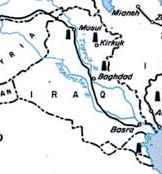Iraq in World War II
Country study from Library of Congress

Mideast from CMH
|
"By the end of the 1930s, pan- Arabism had become a powerful ideological force in the Iraqi military, especially among younger officers who hailed from the northern provinces and who had suffered economically from the partition of the Ottoman Empire. The British role in quelling the Palestine revolt of 1936 to 1939 further intensified anti-British sentiments in the military and led a group of disgruntled officers to form the Free Officers' Movement, which aimed at overthrowing the monarchy.
As World War II approached, Nazi Germany attempted to capitalize on the anti-British sentiments in Iraq and to woo Baghdad to the Axis cause. In 1939 Iraq severed diplomatic relations with Germany--as it was obliged to do because of treaty obligations with Britain. In 1940, however, the Iraqi nationalist and ardent anglophobe Rashid Ali succeeded Nuri as Said as prime minister. The new prime minister was reluctant to break completely with the Axis powers, and he proposed restrictions on British troop movements in Iraq.
Abd al Ilah and Nuri as Said both were proponents of close cooperation with Britain. They opposed Rashid Ali's policies and pressed him to resign. In response, Rashid Ali and four generals led a military coup that ousted Nuri as Said and the regent, both of whom escaped to Transjordan. Shortly after seizing power in 1941, Rashid Ali appointed an ultranationalist civilian cabinet, which gave only conditional consent to British requests in April 1941 for troop landings in Iraq. The British quickly retaliated by landing forces at Basra, justifying this second occupation of Iraq by citing Rashid Ali's violation of the Anglo-Iraqi Treaty of 1930. Many Iraqis regarded the move as an attempt to restore British rule. They rallied to the support of the Iraqi army, which receiveda number of aircraft from the Axis powers. The Germans, however, were preoccupied with campaigns in Crete and with preparations for the invasion of the Soviet Union, and they could spare little assistance to Iraq. As the British steadily advanced, Rashid Ali and his government fled to Egypt. An armis- tice was signed on May 30. Abd al Ilah returned as regent, and Rashid Ali and the four generals were tried in absentia and were sentenced to death. The generals returned to Iraq and were subsequently executed, but Rashid Ali remained in exile.
The most important aspect of the Rashid Ali coup of 1941 was Britain's use of Transjordan's Arab Legion against the Iraqis and their reimposition by force of arms of Abd al Ilah as regent. Nothing contributed more to nationalist sentiment in Iraq, especially in the military, than the British invasion of 1941 and the reimposition of the monarchy. From then on, the monarchy was completely divorced from the powerful nationalist trend. Widely viewed as an anachronism that lacked popular legitimacy, the monarchy was perceived to be aligned with social forces that were retarding the country's development.
In January 1943, under the terms of the 1930 treaty with Britain, Iraq declared war on the Axis powers. Iraq cooperated completely with the British under the successive governments of Nuri as Said (1941-44) and Hamdi al Pachachi (1944-46). Iraq became a base for the military occupation of Iran and of the Levant (see Glossary). In March 1945, Iraq became a founding member of the British-supported League of Arab States (Arab League), which included Egypt, Transjordan, Lebanon, Saudi Arabia, Syria, and Yemen. Although the Arab League was ostensibly designed to foster Arab unity, many Arab nationalists viewed it as a British-dominated alignment of pro-Western Arab states. In December 1945, Iraq joined the United Nations (UN)."
Links:
Europe 1943 | Timeline start | Links | Pictures | Maps | Documents | Bibliography | revised 11/14/02